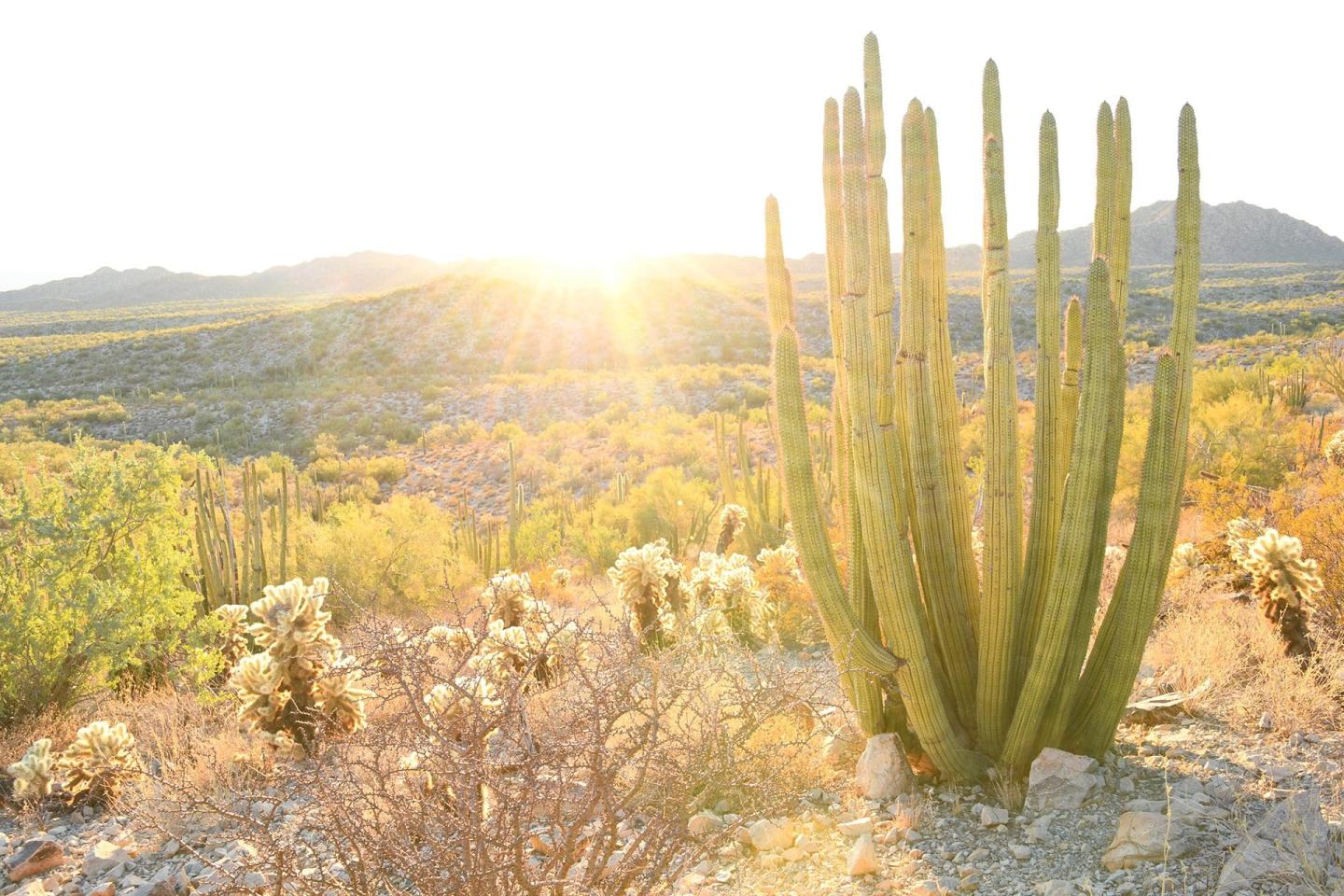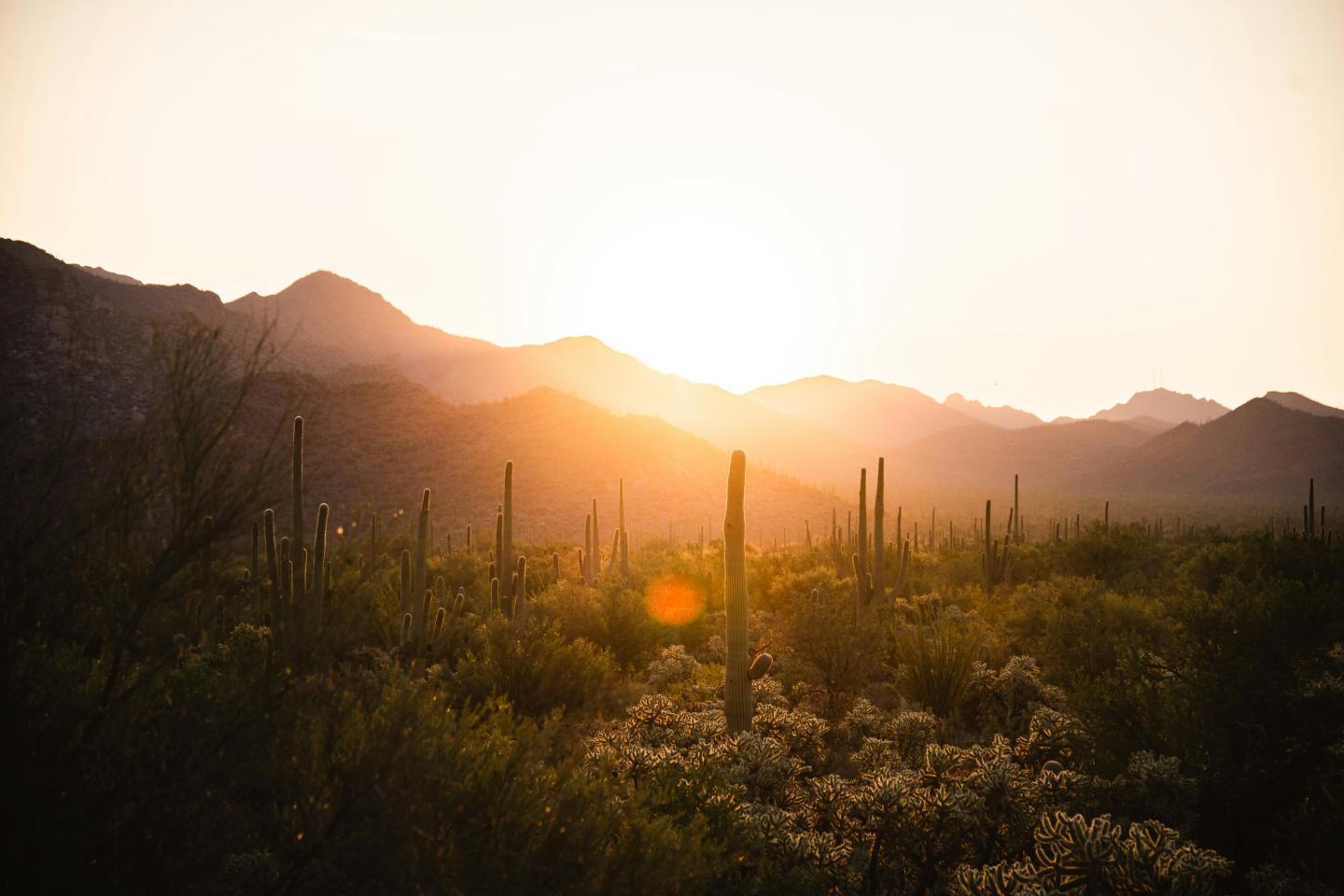
Visit Organ Pipe Cactus National Monument

Nestled in the heart of the Sonoran Desert, the mountains, canyons, and hidden ponds of Organ Pipe Cactus National Monument are like nowhere else on Earth. It’s the only place in the United States where organ pipe cacti grow wild, and is home to several endangered animals and over 270 birds. And with miles of trails and scenic drives and plenty of opportunities for front and backcountry camping, it’s a must-visit for hikers, bikers, and off-roading enthusiasts.
Situated in the southernmost reaches of Arizona, Organ Pipe Cactus National Monument’s landscapes are sacred and significant to many Indigenous peoples, including the Tohono O’odham. An International Biosphere Reserve with some of the darkest night skies in the country, the “Green Desert” is not to be missed.
Read on for a special Park Ranger perspective as Dark Skies Park Ranger Rosemary Williams writes about what visitors can learn about the night sky, and why it is so important to protect dark skies.

Experience the Dark Skies at Organ Pipe Cactus
By Dark Skies Park Ranger Rosemary Williams
Nestled in the verdant Sonoran Desert, Organ Pipe Cactus National Monument is famous for its incredible biodiversity. But did you know that it also has some of the most pristine dark skies in the United States?
Organ Pipe Cactus is one of very few national park sites to have a designated astronomy park ranger who hosts regular constellation tours, astronomy programs, and telescope viewings. What better way to learn about the night sky than surrounded by stunning desert mountains and saguaro silhouettes in our outdoor amphitheater? Get cozy and listen to myths told about the stars, cosmic history under the full moon, or even get your astronomically correct horoscope read.

Get Your Night Sky Questions Answered
Maybe you aren’t sure about diving into a full astronomy evening program and just have a lot of astronomy questions. Perhaps you’ve wondered what being pulled into a black hole feels like or why Pluto was reclassified as a dwarf planet or how many end-to-end hot dogs it would take to reach the moon (yes we’ve gotten this question). Our team of rangers who can answer your burning astronomy questions is growing! The monument is hosting its first ever astronomer-in-residence this year, modeled after Grand Canyon National Park’s highly successful astronomy residency programs. Our astronomer-in-residence will be leading free astrophotography workshops, hosting an astronomer AMA (Ask Me Anything) booth at the visitor center, visiting nearby communities to provide outer space outreach, and presenting special astronomy and telescope programs. Check out our website calendar for a full summary of upcoming events!

Learn About Space With Our Junior Ranger Program
If you’re traveling with an aspiring astronaut or budding astrobiologist and are on the hunt for out-of-this-world activities, stop by the visitor center and pick up your very own free Night Explorer Junior Ranger guidebook! The journey of learning and understanding our place in time and space can feel overwhelming, but our cosmic heritage is always with us – the iron in our blood, the calcium in our bones, the oxygen in our lungs all came from the stars. The NPS Junior Ranger book is a perfect way to begin exploring the universe from the beautiful scenery of a national park. Plus, anyone who stargazes their way through the guidebook receives their very own Night Explorer badge.

Want to show your love and support for these incredible lands?
Shop WNPA’s Organ Pipe Cactus collection of apparel, books, collectibles, and more!

Why Are Dark Skies Important?
Organ Pipe Cactus hopes to join the growing list of certified Dark Sky Parks in the next coming years, and park staff have retrofit hundreds of outdoor light fixtures to be more dark-sky friendly. The pay-off has been incredible, and most of the park now boasts Bortle Class 2 skies (this means they’re pretty dang dark!). Preserving dark skies isn’t just a vanity project for astronomers, it has significant ecological impacts. Life on Earth evolved to survive under specific light and dark cycles, known as “circadian cycles.” As we move toward a future with fewer truly dark places, plants and animals have been severely impacted.
An estimated 100 million migratory birds are killed each year due to disorientation from excessive lighting and baby sea turtles that typically use moonlight to navigate from the beach to the sea have been spotted wandering toward brightly lit highways instead. Even the dung beetle relies on darkness, using the Milky Way to determine which way to roll its ball of dung! Over 80% of Americans can no longer see the Milky Way from their homes, and whether or not this is you, you have a home with us under the Milky Way at Organ Pipe Cactus. Half our park is after dark, and we are excited to extend our conservation efforts beyond the park land itself and into the skies above.
As Carl Sagan once said, the cosmos is within us … we are a way for the universe to know itself. Get to know yourself and get to know the stars at Organ Pipe Cactus National Monument. Until then, wishing you clear skies.

Upcoming Dark Sky Events at Organ Pipe Cactus National Monument
Are you interested in the stars and love supporting your national parks? Keep an eye on our calendar for upcoming events!
March 1 – Annual star party at Twin Peaks Campground. Attendees will be serenaded by pianist and astronomer David Koerner under the stars, followed by telescope viewing with the Tucson Amateur Astronomy Club and astrophotography with our astronomer in residence.
March 8 – New Mexico Poet Laureate Lauren Camp will lead an evening of poetry under the stars, followed by night sky prose with our astronomy park ranger.
March 14 – Telescopes will be available for public viewing at Ajo’s LoveWorks festival, just outside the park. For the biggest space nerds, be sure to check out Kitt Peak National Observatory on your way down to Organ Pipe Cactus National Monument. You will not be disappointed!

What Visitors Are Saying About Organ Pipe Cactus National Monument’s Dark Skies
“The stars here at night are spectacular”
“The stars at night were bright and plentiful.”
“Beautiful sunsets and clear skies at night for star gazing.”
“This is a beautiful place; magnificent scenery of desert vegetation and wildlife under a star-filled desert sky.”
“Spectacular sunset and clear starry night sky.”
“If you are a night sky watcher this is your place.”
Rosemary Williams is a Dark Skies Park Ranger at Organ Pipe Cactus National Monument.

Want to help preserve these significant lands for generations? Your donation supports kids’ programs, research, Indigenous artists’ demonstrations, and more.



